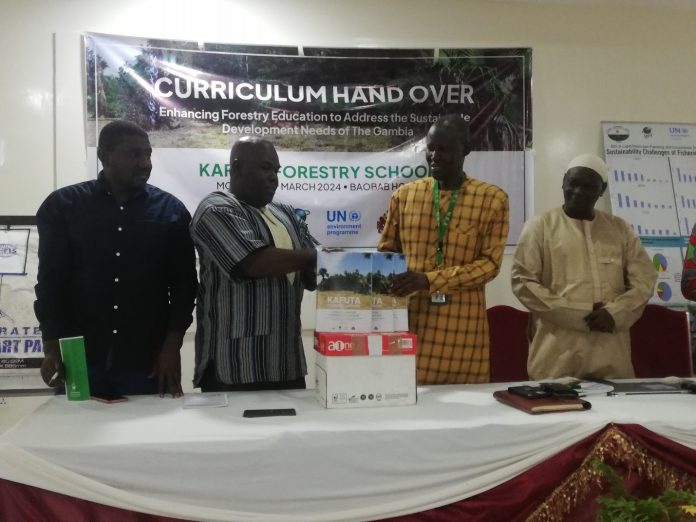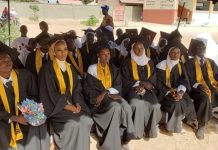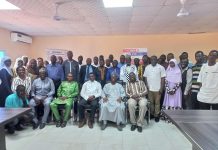By Madiba Singhateh
The National Environment Agency under the GEF, Land and Seascape Project, last week Monday, 18 March, 2024 launched “The Landscape Planning and Restoration Curriculum” at Kafuta Forestry School.
The launch was done on the sideline of a workshop held at a local hotel in Bijilo, organised by officials of the project.
According to the organisers, the handing over of the Landscape Planning and Restoration Curriculum Project is to improve Ecosystem Services, and livelihoods, expand and effectively manage protected areas.
The curriculum was funded by the Global Environment Facility (GEF) through the United Nations Environment Program (UNEP) and implemented by the National Environment Agency of the Gambia.
Speaking at the handing over ceremony, Ousainou Touray, Project Coordinator GEF 6 Land/ Seascape, said the Gambia is a party to several environmental conventions and protocols and has undertaken several initiatives that have contributed to the implementation of these MEAs and the rational conservation and management of forest resources and ecosystems.
Speaking further, he said after consultation with the DoF as a collaborating partner to initially launch this initiative, it was agreed that the overarching goal of the project aligns closely with the objectives of the school (Kafuta).
He said this vision underscores the importance of integrating sustainable practices into all levels of land and resource management.
“The development of a comprehensive and diverse curriculum for the Kafuta Forestry School is an essential step towards achieving sustainable forest management and conservation in Gambia. The objectives of the curriculum are multi-faceted and are aimed at addressing the current gaps in forestry education in the country,” he expounded.
According to him, the curriculum has been designed to ensure that students receive a holistic education that is both practical and theoretical.
In conclusion, he said the curriculum has been designed to cover a range of topics that are relevant to Gambia’s forestry sector.
He posited that the courses are intended to provide students with a solid foundation in the principles and practices of sustainable forest management and conservation, and also equipped them with necessary technical skills required for effective management of forest ecosystems.
Mr Momodou Lamin Njai, the Principal of the School, gave a brief background of the school which he said, was instituted by the Forest Act and established first as in-service training Section on Forest Protection in 1992, and was later upgraded to in-service and pre-service training centre in participatory forest management in 1994.
However, he said in 2000, the institution was again upgraded from the Training Centre to Kafuta Forest Training School and the Department of Parks and wildlife integrated it in the sector in 2008.
Njie reiterated that the institution was upgraded to National School of Forestry in 2011.
“Interestingly, the school has trained, certificated and graduated 14 batches of 265 students from inception to date. Out of these graduates 52 students were female,” he said.
Principal Njai expressed enthusiasm and elation with the collaboration efforts of the Global Environment Facility of the United Nations Programme (UNEP), the NEA and all stakeholders involved in funding and developing a forward- looking curriculum for the National School of Forestry.
“This great achievement marks a significant milestone in the department of Forestry journey and the school in particular towards promoting sustainable forestry education and practices in the Gambia, aiming to enhance environmental conservation efforts and address the pressing challenges of climate change and deforestation and biodiversity loss,” he stated.
Messrs Dawda Badjie, Director of the Agency and Cherno Gaye from the Department of Forestry, also dwelled on the
importance of the conservation of the environment and the forest.




















